#labor market insights
Text
The Influence of Labor Market Insights on Counseling Trajectories
In today's dynamic job market, career counseling has evolved to incorporate labor market insights as a crucial factor in guiding individuals along their career paths. By leveraging data-driven approaches, career counselors can provide personalized guidance tailored to the current demands and trends within specific industries and job sectors. Understanding the labor market landscape enables counselors to offer informed advice regarding skill development, job search strategies, and career advancement opportunities. Moreover, by staying abreast of emerging job trends and economic shifts, counselors can assist clients in making proactive decisions to stay competitive and adaptable in their chosen fields. Ultimately, integrating labor market insights into career counseling trajectories equips individuals with the knowledge and resources needed to navigate the complexities of today's workforce and achieve their professional aspirations.
1 note
·
View note
Text
We cannot understand industrialization outside the history of colonialism, and its relationship to a system of accumulation of surplus value – capitalism. Following the insights of Samir Amin, Celso Furtado, Raul Prebisch, Eric Williams, Utsa and Prabhat Patnaik, and Walter Rodney, amongst others, this perspective characterizes the seemingly apolitical process of industrialization as linked the violence of primitive accumulation, commodification, exchange, and war. That is, the slave trade, the colonization of the United States, the erection of colonial plantations in Africa, the Caribbean, Asia, and Latin America, all contributing the raw materials, food items, and export markets which subtended the low-waged process of European and eventually US industrialization. These processes, whose echoes are still reverberating, produced a massive amount of CO2 emissions. Furthermore, contemporary patterns of exchange, although not occurring under direct colonial patterns of control, are still unequal on South-North lines. That is, trade between formally independent states, based on the seemingly efficient price system, hides a new mode of control. An hour of labor in the North continues to receive a far higher reward than an hour of labor in the South, even when using similar or identical technologies, and northern products exchange for ever-increasing amounts of southern resources over time. As a result, wealth concentrates in the North, in part because wages and profit concentrate there, and produce and reproduce social-economic polarization within the world system.
67 notes
·
View notes
Note
perhaps foolishly throwing my hat in the ring here about cohost developers making 90k/yr (as someone who used cohost for like five minutes but does work in software. although I'm not even close to making SWE-level money lol): depending on your stack, experience, location, other benefits, etc., that's genuinely in the bottom twentieth percentile for engineer salaries at your average startup, if not lower. especially for a "founding engineer who does literally everything"-type role. idk how much experience these people have or what their stack is, but just to guess, at your average seni-marture startup they could easily double that salary, and at a big FAANG company or whatever stupid acronym we're using now they could probably quadruple that, plus or minus whatever part of your comp package is stock instead of actual salary.
there are a couple interesting/relevant reasons I bring this up: (1) at really really early-stage startups, where you only have four guys and a couple hundred grand in the bank, having bottom-twentieth-percentile salaries is normal *because they make up for it by giving you a shitload stock options that will theoretically be worth a lot in the future*, if things ever take off, although of course they rarely do. in cohost's case, it doesn't seem like stocks and shit were part of their long-term plans (which, fair enough, not trying to say they should've been), so in theory the cohost devs were making a lottt less than your average early-stage startup devs, even though overall comp at an early-stage startup is mostly monopoly money.
(2) the other thing is that if the pay is uncompetitive, which it obviously was, then attracting worthwhile talent is really hard. again, idk these devs, they could all genuinely be very good at their jobs. and cohost was clearly a passion project for them. but it makes me wonder if *some* (not all) of their problems stemmed from technical or even positioning/market issues that having more people or more experienced people would've solved, and they just weren't able to hire them. especially since they were doing design work and moderation and other shit in addition to plain old engineering!
I guess my angle here is that unless you see how the sausage is made, it's really really easy to underestimate just how much money (and human labor!) it takes to build anything, and that most projects only manage to pull it off for as long as they do thanks to a near-bottomless supply of venture capital funding. even not-for-profit community projects (which I was considering whether something like cohost could survive as, but even then I'm unsure) rely on corporate sponsorship and free labor from people who are getting paid a lot of money at their day job. so like many of you I am not at all shocked that they're folding—easy to say in hindsight but I definitely say this coming, although maybe not so quickly lol.
but like, even most VC-funded startups fail despite having way better odds and a shitload more money. legit kudos to them for trying anyway, because the only way we get cool shit is if someone's willing to take a risk and maybe fail. that said as a *user* there's still no way I'd hitch my wagon to a fledgling startup unless I was totally okay with that wagon falling into a gulch within 24 months, because that's usually what happens
interesting insight. thanks boss. much to learn about this world that, as an outsider, seems uniquely annoying and stupid to try to navigate
48 notes
·
View notes
Text
Trouble Comes Twice - the Postmortem

We celebrated Trouble Comes Twice's anniversary around a month ago! We'd hoped to post this postmortem back then as well, but it's taken us a moment to find the right words haha.
Anyway, we hope that this postmortem can give our players and other visual novel devs some insight into what the development process looked like for us. It's also a great way for us to look back at what went well and what went less well.
We'll be taking about the ideation phase, our (lack of) marketing for the Kickstarter, and also sharing (what we can) on our earnings from the game!
Coming up with Trouble Comes Twice

The original tone of Trouble Comes Twice was a lot more comedic and packed to the brim with anime tropes we enjoy. Most didn't make it into the final game, but some stayed and evolved e.g. all of the love interests are based on popular visual novel archetypes - the childhood friend, the tomboy, the shy girl, and the bad boy.
Some, like Cameron and Zoe, changed a lot from their concept while Adrian and Stephanie stayed quite loyal to our original ideas of them. Cameron's character actually underwent the most changes after the initial reception to the demo, where a lot of people felt like he was too much of an ass haha. (Fortunately, he became a fan favorite when we dropped the new demo!)
The premise with the bet was something we invented to create some drama and establish a common plot thread throughout each route. Honestly, looking back, we would probably have approached the bet differently if we wrote it today and a lot of our pre-planning was... clumsy, at best. Still, it was a labor of love and I'll never forget the fun and excitement we had everyday balling ideas for the characters and coming up with their designs.
As Melli and I are just writers with limited coding experience, we worked with a past game jam friend to code the GUI and set up the base for the game (though the actual scripting was done by us and Melli put everything together in the end). Our biggest expenses pre- and post-demo was the character art and CGs, meanwhile we relied on free music and BG packs to save money.
Why a bisexual romcom?
So, this was sort of a no-brainer to us. We had decided right from the start that both twins could date both the male and female love interests, and (at the time) we feel that a lot of similar games had playersexual MCs rather than established bisexual/pansexual MCs. While playersexual charas are also awesome, we wanted to write a romcom where the main cast are always queer regardless of who you end up romancing.
At the same time, bi/pan people don't all approach romantic relationships the same way e.g. Cameron is confident and has experience dating people of all genders, while Adrian's demi and Jace still struggles a bit with his attraction towards men. We know that some of our players felt like that made certain routes less romantic than others and we hear you on that feedback and have 100% taken it into consideration for our future romance games. But anyway, that was our thought process behind Trouble Comes Twice's romance dynamics!
Preparing for Kickstarter & the actual Campaign
Our Kickstarter launched at the start of August and let me tell you, we were nowhere near as prepared as we should have been. 😭 We hadn't set up a Steam page yet, we were trailer-less, and we only had a couple of hundred followers across our socials at best. I feel that there's a lot more successful Kickstarter projects to refer to and even a lot of marketing guides and advice now, but mostly it's on us for not researching more.

The Kickstarter campaign did surprisingly well despite the lack of promotion and only having a rough alpha demo - we were even able to double our goal! - but we wouldn't recommend what we did for other devs.
You should invest time into making a good demo, spend time building an interested audience before launching your campaign, and research so you've got some kind of marketing plan. We were lucky with word-of-mouth and that other visual novel devs with larger followings helped share our game, but we should have made more effort reaching out to bloggers, streamers, and game sites. Some crowdfunding successes may seem like they came out of nowhere and were just pure luck, but there's usually a lot of grinding behind-the-scenes that you don't notice.
The post-Kickstarter era, at least for us, was the harder bit. We now had 353 loyal backers who had expectations based on promises we had made and we had to make sure we met those expectations while also staying true to our wants as the devs. It was a learning process for sure, but we're fairly proud that we always did our best to keep our backers in the loop. It's frustrating to write an update explaining that the game has been delayed again, but backers are more open to being understanding than you think as long as you communicate!
A tip we'd give to new devs considering Kickstarter: Don't overestimate what you can do, but overestimate what you need. There's always hidden costs, unexpected taxes/fees, and other unknown obstacles that might eat up your budget. In our case, we made enough to make the game as planned, but had to change CG artists around halfway through development which meant our original budget didn't cut it anymore. Fortunately, we had earned a decent amount from our Patreon and pre-orders that we were able to use to complete the CGs, but that isn't always going to be an option for everyone and that also meant we were unable to use that money ourselves. (We didn't take any money from the original Kickstarter campaign, so whatever was earned through patreon and pre-sales was our only "salary" at the time.)
Writing the game
Writing is, for obvious reasons, one of the most important parts of a visual novel. Melli wrote Jace's routes and I wrote Hazel's routes, which removed some pressure off our shoulders compared to trying to write over 300,000 words all on our own.
It's fun working with another writer, but there are also some unique issues and considerations that come up when you're writing a game with two protagonists split between two writers. Especially because at the time, there weren't many visual novels with a similar set up to refer to.
The main things we learned, were:
Consistency. We wanted each couple to have their own dynamic, but the characterization needs to remain consistent between routes. You don't want Adrian in Jace's route to feel like a totally different character in Hazel's route. Additionally, we had to be careful that the tone and writing style of the protagonists' POVs still felt like you were playing the same game. Some routes can be more comedic than others, but we've got a problem if Hazel's routes are all (unintentionally) more serious/angsty in tone than Jace's or vice versa.
Watch out for your word count! Longer does not always equal better and writing eight routes, we had to put some restrictions in place. Even when writing on your own, it can be tough to guess how long your story should be, and it was important to us that the routes were roughly the same length so that none felt more "canon" than the other. However, with two writers who have different writing styles and ways of planning, it was tricky to compare our outlines and we struggled at times when it came to matching each other's word counts. Moving forward, we're probably going to be more lenient when it comes to word counts - some routes have to be longer than others, it doesn't mean that route is automatically more "important". We're also doing more regular meetings and frequent check-ins to make sure we're on the same page. In the future, we hope that should save us a lot of trouble when it comes to pacing! 🙈
Balancing your own wants with the wants of your players. In theory, these overlap most of the time. But making a commercial game (that people had already "bought" through the Kickstarter), there is some pressure when it comes to meeting certain expectations. We can't always just write what we want and assume everyone else is going to love it, but we also don't want to neglect what we personally like. We had a survey for the beta where we were able to get regular feedback and a lot of helpful advice. We definitely want to continue with surveys in the future - they are a great way to gather opinions from different players and figure out what works versus what doesn't!
We took on too many tasks outside writing that distracted us. This bit is sort of inevitable for indie devs like us. 😅 Working with a limited budget and limited resources, you just end up having to wear a lot of hats! We think we did quite well sharing these duties though, and moving forward (thanks to you guys) we can afford more hands on deck to help us out.
Marketing
The bane of every indie game dev's existence... although secretly, I kind of enjoy marketing but don't tell anyone that!
Having learned a thing or two from promoting the Kickstarter, we spent more time researching games marketing but in the end, trial and error was the best teacher.
As we got closer to the release date, we were posting almost daily on social media and grew our Twitter to over eight thousand followers. We didn't have any viral posts, but we saw a consistent growing interest in our game and it was such a motivation boost to see comments from potential players being excited for the game. We know a lot of devs have said that Twitter didn't help their game much but according to our stats, a decent number of our players found us through the platform.
We saw less success here on Tumblr. Perhaps we haven't cracked the code here yet or maybe we're just comparing our numbers from Twitter unfairly! We're not hung up about it though, we love it here because it feels easier to connect with our followers and other devs there, and it's nice because we're able to write longer posts like this one! 💓
Aside from posting on social media, we reached out to several streamers and some bloggers prior to release to send them free game keys.






We also commissioned some art from other artists to share, as we obviously couldn't reveal ALL our CGs before the release lol and visual posts tend to do a lot better in our experience. It was so much fun to see the characters in other art styles and we hope we can afford to commission guest art pieces a lot more frequently in the future!

In hindsight, we definitely regret not releasing a trailer sooner! We underestimated how much interest a good trailer could garner and delayed setting up our Steam page because of it. Steam was the platform where we sold the most copies and most of our buyers found the game through Steam itself.
Also, posting your trailer on youtube adds another site where you're promoting your game so there's really no reason not to get that trailer done as soon as you can.
Final Notes
After the initial stress, we were pretty happy with our release! Although there were some things we would go back and change if we could, that's just the nature of these kind of things. For the most part, we're proud of what we achieved and happy that we have learnt so much from Trouble Comes Twice that we can take into consideration for future projects.
We can't share exact numbers, but we wanted to open up a bit about our earnings for the game to help other aspiring devs:
As of writing this, Trouble Comes Twice has earned close to 85,000 euros. This counts our profits from 2020 to now (the Kickstarter, Patreon, pre-sales, and actual sales). Removing fees, taxes, the salaries of our talented artists and other freelancers, as well as the money invested into our next game, our personal pockets did not see anything close to those numbers. But we're super proud of how much our little game has made and so grateful that it's allowed us more creative freedom with our next title!
So, what's next?
You might have heard but for the past year, we've slowly been working on the demo and upcoming announcement for our next visual novel:

A 17+ supernatural neon-noir romance game about monsters, love, and other horrors.
Play as vampire detective Circe (female protagonist) or hellhound cop Dante (male protagonist) and delve into the mysteries of North Haven, where demons, vampires, and supernaturals hide in plain sight among humans.
The game features six routes, with three romance options available to each protagonist. Dante only has male romances and Circe has both male and female romances.

The game tackles a darker, more angsty tone compared to Trouble Comes Twice. Still, we hope that those who decide to check it out will enjoy it! We plan to announce the game this coming Autumn. Follow our Twitter (we're still not calling it X sorry) or Tumblr to stay up to date.
58 notes
·
View notes
Text
How times are changing….
2024, The Russian Tea Room: Lunchtime with the Masters of the Universe. John and Richard were at the peak of their powers. The sky was the limit. Whatever money could buy, these two had it. And they had a lot of it. And as soon as Trump was back in power, there would be much, much more.
John: Good afternoon, Richard. It’s been too long since our last lunch.
Richard: Good afternoon, John. Yes, it has. How have you been?
John: Very well, thank you. Busy as always, but things are moving in the right direction. How about you and your family?
Richard: We’re doing well, thank you. My son, Alexander, has just received his acceptance letter from Yale.
John: That’s excellent news! Congratulations to Alexander and to you. Yale is a fantastic institution. He must be thrilled.
Richard: He certainly is. We are all extremely proud of him. Yale offers unparalleled opportunities and will undoubtedly shape his future in the best possible way.
John: Absolutely. With a Yale education, Alexander will be well-prepared for any challenges he faces. Have you thought about how the current political climate might affect his future prospects?
Richard: Yes, quite a bit. We’re hopeful that the new government will adopt more protectionist policies and take a stronger stance on immigration. These changes could significantly impact the economic landscape.
John: I agree. A more protectionist approach could provide substantial benefits to our domestic industries. If the government prioritizes national interests over international ones, we could see a thriving local market.
Richard: Exactly. Limiting immigration and focusing on domestic employment could create a more favorable environment for our economy. This would be particularly advantageous for someone like Alexander, who will have the skills and knowledge to navigate such a market.
John: With fewer immigrants, there could be more opportunities for domestic workers, potentially leading to higher wages and better job prospects for citizens. This aligns well with our economic goals.
Richard: Precisely. Alexander is considering majoring in economics with a focus on international trade and policy. If the government shifts towards protectionism and stricter immigration controls, his expertise will be highly valuable.
John: That’s a smart move. Understanding the implications of protectionist policies on trade and the economy will be crucial. He could be at the forefront of developing strategies that align with national interests.
Richard: We’re certainly encouraging him to build strong connections at Yale, particularly with professors and industry experts. These relationships will be invaluable as he navigates his career.
John: Networking is essential, especially in such a dynamic environment. With potential policy changes, those connections could provide critical insights and opportunities.
Richard: Absolutely. It's an exciting yet uncertain time. However, with the right preparation and strategic thinking, Alexander could thrive in this new landscape.
John: Have you considered the political approaches of other countries, like Russia? They have implemented stringent immigration policies and strong protectionist measures with notable success.
Richard: Yes, we have. Russia’s policies have indeed bolstered their national industries and maintained a tighter control over their labor market. Their approach offers valuable lessons on how to prioritize national over international interests.
John: Exactly. If our government could adopt some of those measures, it could significantly strengthen our domestic economy. Alexander’s timing couldn’t be better.
Richard: I completely agree. It’s a critical moment, and with the right guidance and education, I believe Alexander will navigate it successfully.
John: I have no doubt about that. He has a solid foundation and your support. The future looks very promising for him.
Richard: Thank you, John. That means a lot. Here’s to hoping the new government’s policies will pave the way for greater opportunities and a stronger economy.
John: Cheers to that, Richard. To Alexander’s success and the promising times ahead.

2027, Brownsville Social Welfare Office: Alex and Mike were destined to follow in their fathers' footsteps. Oil barons and investment banking gods. But things don't always turn out the way you want them to…
Alexander: Hey there, Mike. Ain’t seen you in a coon’s age. What’s got you waitin’ at the social office today?
Mike: Hey, Alex. Just tryin’ to get some more assistance. Amy’s knocked up again, so I gotta sort things out. What about you?
Alexander: Same ol' crap. Need to see if they can help me get some dentures. Got my teeth busted in a brawl last month. Ain't lookin' too pretty.
Mike: Dang, man. That’s rough. Sorry to hear it. How’s things otherwise?
Alexander: Not too hot. After the market took a dive, had to drop outta Yale. Now I’m bustin’ my hump as a day laborer for that agribusiness. You know, the one that got snatched up by that Russian fella?
Mike: Yup, I know the one. Same deal here. Never thought we’d end up like this. Six kids now and no real job. That crash sure did us in.
Alexander: Tell me ‘bout it. I was this close to finishin’ my degree. Now instead of workin' in finance, I’m haulin' corn and doin' grunt work. Feels like some kinda bad joke.
Mike: I hear ya. I was studyin' to be an engineer. Now, I’m just tryin’ to get by. And since the Russian took over, it’s been even worse. Cut our hours and benefits to the bone.
Alexander: Yeah, I noticed. They don’t give a rat’s ass 'bout us. Just squeezin' every penny they can. It’s tough.
Mike: Sure is. And with another mouth to feed, it’s stressin’ me out. Amy’s worryin’ herself sick, and I ain’t got a clue how we’ll make it.
Alexander: Wish there was a way outta this mess. What’re we supposed to do? Every time I think I’m gettin’ ahead, somethin’ knocks me back down.
Mike: Same here. Feels like we’re stuck in mud. I keep hopin’ things’ll get better, but it’s like we’re just spinnin' our wheels.
Alexander: Worst part is knowin’ we had so much potential, ya know? We were supposed to have these big careers, and now we’re just tryin’ to make it day by day.
Mike: Sometimes I low-key ponder the insane what ifs if the freaking crash hadn't ruined everything. Like, imagine where we'd be RN. Rolling in that sweet juicy success, probs. We'd be slaying life, swagging out and straight up crushing it. Just living our best lives and probably having our dicks in…
Alexander: Yo, bruh, like legit, we'd be in a whole different stratosphere if we weren't chilling at this social welfare spot right now. But hey, we gotta keep on keepin' on, for the youngins and for us too. And if that lil' monster in your pants is acting up, hit me up anytime, I got your back!
Mike: Yo, bro! I was seriously starting to think you were never gonna bring it up... My urges are off the charts, I'm dying for some primo bootay to slam once more.
Alexander: Yo, like seriously, I gotta wait for a freaking eternity, like thirteen freaking numbers long. Dude, in that never-ending time span, you might as well give me a good ol' romp and suck fest, ya feel me?
Mike: Oh man, like seriously, watch out, but like, make sure you don't end up with a bun in the oven, okay? 'Cause, like, I'm totally the supreme stud around here when it comes to spreading my seed, ya dig?
Alexander: Yo, quit yapping and just slide through already! I'm totally gonna take this wild risk, no cap! Let's get this party started, fam!
41 notes
·
View notes
Text
Quiet Corners of the Galaxy, Chapter 5
While on a routine mission for Cid, the Bad Batch encounter a woman fleeing from the Empire. Crosshair suspects her seemingly free-spirited, nomadic existence is actually a cover for something else, but struggles to keep his attraction toward her in check as their personalities and ideals clash.
Relevant tags: Slow Burn, Enemies to Lovers, Eventual Smut (not for a few chapters still), Canon-Typical Violence
Chapters posted 1-2x weekly!
Read the full fic so far on AO3
Read previous chapters on Tumblr: Ch. 1 l Ch. 2 l Ch. 3 l Ch. 4
Chapter 5 summary: The Batch arrives back on Ord Mantell, where Crosshair keeps an eye on Dara. We find out where Omega has been these last few chapters.
By the time they arrived on Ord Mantell, Dara had succeeded in sharing sips of the grassy beverage with every member of the squad but Crosshair, chatting openly, even charmingly, with each one of them. They were regaled with languid observations of her time on Endor and other planets she’d encountered in her years traveling, many of which they had never visited themselves—she had, understandably, avoided the war-torn planets they were most familiar with. Dara seemed, for all intents and purposes, to be a solitary nomad with no occupation, just brief stints of day labor wherever she could get it passing through. She met people; she worked in markets and ran errands for shopkeepers; she helped with harvests; she spent months alone on uninhabited moons, living out of her ship and watching the stars. Her blasters, she claimed, were for protection, not only from seedier elements in the cities she traversed, but bandits and creatures. She liked traveling alone, she said, but there were dangers, too.
When the hatch opened in their usual landing bay, Tech assessed Dara’s injuries with one final scan. “The symptoms associated with your concussion appear to have subsided. However, you will likely continue experiencing some pain elsewhere for several more hours.”
She rose slowly, still limping a little as she tested the feeling in her leg and hip. “I really can’t thank you all enough.”
Wrecker, the friendliest among them, seemed a little disappointed to see her go. “Hey, come find us if you need anything!”
She brightened a little. “Of course, big guy! Maybe I can buy you all a drink to show my appreciation. Hope I see you around.” With that, she turned and made her way out of the bay, disappearing into the crowded streets of Ord Mantell as they watched from the top of the ramp.
“She’s lying,” Crosshair insisted immediately.
He expected pushback from his brothers, so he was surprised when Hunter agreed. “Oh, yeah. She’s pretty good. Most of the time her heart didn’t even stutter a little. Maybe she was even telling the truth sometimes. But the shuttle…that’s not what happened. I don’t even think she was on Takodana.” Crosshair admitted to himself, begrudgingly, that he should have known his brother wouldn’t be so easily duped. Hunter’s enhanced senses gave him a unique insight into the subtle bodily tells that would have betrayed her efforts to bury the truth.
“Indeed. While the majority of the information that she provided regarding her travels was accurate, her timeline for her visits for at least the past year most certainly was not. For example, Boonta Eve is not celebrated on Tatooine during the period that she claimed to be living there,” Tech contributed.
Hunter nodded decisively. “Crosshair, keep an eye on her. There could be a lot of reasons she’s lying, but she knows we work out of Ord Mantell now, so we should at least try to find out if she’ll be a problem for us.”
Crosshair wasted no time before deftly scaling the sides of the landing bay to track her from the rooftops. He spotted her quickly, her silver hair bobbing among the crowd as she made her way down the street. There was a determination in her step despite the ongoing limp, her earlier attitude of carefree traveler gone as she navigated the city like an expert. She did not stop to inquire at the spaceport about shuttles that could take her to her next destination, instead marching block after block, occasionally doubling back deliberately while scanning the crowd, peering at the shop signs as if looking for something. Finally, she entered what appeared to be a curio shop, exiting twenty minutes later.
Leaping easily from rooftop to rooftop, the sniper tailed the mysterious woman all through the afternoon, watching as she paused at market stalls, chatted with vendors, and ducked into innocent-looking stores. Any purchases she made within view appeared to be innocent: resupplies for her camp kit and other necessities for a nomadic existence, all of which the Bad Batch was deeply familiar with from their years at war and their fugitive lives since. Once, Crosshair witnessed her deftly catch the wrist of a pickpocket as the youth brushed against her, giving him a stern look before he could get his sticky fingers on any of her credits, but otherwise letting him go unharmed and without protest. She occasionally turned down dead-end alleys, only to duck into a doorway and wait a few beats before returning the way she had come.
Whatever she was doing, she was cautious about not being followed. Of course, he was no ordinary observer.
The sun was beginning to set by the time Crosshair gave up his pursuit. He made his way to Cid’s parlor, scowling at the familiar neon sign on his way in, removing his helmet and sticking a toothpick in his mouth as he entered. The rest of the squad had delivered the goods to Cid and were huddled around a table, drinks in hand. They looked at him expectantly as he threw himself down in a seat.
“She’s experienced at evading a tail and didn’t even bother to ask at the spaceport about shuttles, but other than that nothing out of the ordinary,” Crosshair reported. “Mostly restocked on supplies all afternoon. Standard stuff, except for a trip to an antique store. I couldn’t see if she bought anything there.”
Cid, who was lurking about nearby with a sponge—cleaning what, Crosshair didn’t know, since the place was as filthy as always—narrowed her beady, reptilian eyes. “What kind of antique store?” she asked suspiciously.
Attentive and thorough as always, Crosshair had memorized the name of every shop she had entered. “Old Ord Salvage.”
“Huh.” The Trandoshan looked intrigued. “Where’d you say you picked up that girly?”
Echo’s eyes darkened a little, betraying his distaste for their employer. “Why? You know something?” he asked.
Cid’s face returned to its usual expression of contempt. “Jeez, you boys are lucky you have me to keep up with things for you. Old Ord Salvage is a front. There’s a back room where smugglers and other shady characters—such as yourselves—can use their sub-space communications set-up to send long-range transmissions without the Imperial authorities picking up on them.”
“Well. Dara did, in fact, hijack a shuttle, then flee from and kill several Imperial stormtroopers. It stands to reason that she would seek to remain off the Empire’s radar,” Tech considered pragmatically.
Crosshair shook his head, frowning. “She went straight there immediately after she left us. She already knew about where it was and how to access it. This isn’t the first time she’s had to avoid the Empire—she has experience. We should leave Ord Mantell—she can connect us to it, it’s compromised.”
“I don’t think so, skinny,” Cid interrupted. “You lot have work to do. The next few jobs I have lined up are time sensitive.”
Seeing Crosshair open his mouth to reply, Hunter stepped between the two of them decisively, avoiding whatever violent threat the sniper was about to make toward their employer. “She’s right. We’ll ask Rex to see if he can find out any info on Dara from his contacts. Just so we know if she’s someone we have to worry about or not. In the meantime, we’ll keep an eye out. I have to go contact Omega and let her know we’ll be a little while longer while we finish these next jobs for Cid.”
Wrecker seemed disappointed to hear they wouldn’t be heading back to Pabu soon. “Aww. The kid’s not gonna be happy,” he lamented. When they had left Omega, they had expected to complete one quick job before they returned. Now they would be apart from their sister for weeks—although she understood that the extra credits they were scrounging up would help fund Rex’s rebel clone network.
Hunter sighed. “I know. I miss her too. But it’s good for her to be around friends her own age, for a while, anyway. We’ll go back to pick her up soon.” The sergeant got up, making his way toward the parlor’s back rooms to make his calls. Crosshair stalked after him.
“I don’t like this,” he murmured unhappily.
Hunter was thoughtful. “I don’t much like it either. But whoever Dara is, it’s clear she’s no friend to the Empire. There can’t be too much to worry about.” He gave his brother a comforting pat on the shoulder before exiting, leaving the sniper chewing unhappily on his toothpick in the dingy bar.
Next chapter
#bad batch#clone force 99#the bad batch#star wars#tbb spoilers#clone wars fanfiction#tbb crosshair#tbb hunter#tbb fanfiction
22 notes
·
View notes
Text
not sure people on the conputer grasp that the IWW's structure was a reflection of the labor market when it was formed. allowing all workers to be dues-paying members makes a lot of sense if there are a substantial number of itinerant laborers not tied to any particular workplace or location. note also that the IWW itself by and large did not achieve very much at the time. in trying to draw upon the past for insights into the present, might i suggest another organization--a particular congress, industrial in character?
17 notes
·
View notes
Text
Waylon (Character sheet)


Picrew
Playlist | Masterlist | Character Info
Wyatt’s older brother and Eleanor’s and Waylon Sr.’s crowned golden child, Waylon Jr. (Lon), is a cunning businessman with a folksy “cowboy Don” exterior who has climbed his way to the top of Apocamerica's underworld. Masking behind a stoic demeanor lies a ruthless opportunist who will stop at nothing to maintain power and control, sight set on building an empire through tactical manipulation and calculated brutality. A master of playing all sides, he uses his charm and wit to get what he wants. Waylon's loyalty and protection are renowned but conditional, and he'll discard anyone who becomes a liability. Nevertheless, he has a deep sense of fidelity to his close circle of those he cares about, but good luck on peeling back his multi-layered façade to reveal his complex web of allegiances that crown him as leader of the remaining free world. His bond with his younger cousin Vinny is unbreakable–Vinny selflessly often acts as the mediator between Waylon and Wyatt.
Meanwhile, Waylon's circumstantial partnership with The Aid—whom he sees as a vital asset in his quest for power—has been a double-edged sword. The Aid’s insights grant him an unparalleled advantage but ensnare him in a cycle of violence, deceit, and jealousy with his business associates. His relationship with Wyatt has been fraught with tension since childhood. He struggles to reconcile their glaring differences–made all the worse by Wyatt’s persistent abuse of Waylon’s most coveted advisor–The Aid.
Full name: Waylon Hugo Weston Sullivan Jr. (Lon)
Role: tertiary antagonist, Whumper, Wyatt's foil character
Date of Birth & sign: January 18, 1972 (60), Capricorn (story takes place in the year 2032)
Gender: cis-male
Sexuality: hetero
Height: 6'4"
Weight/body type/build: 60-year-old dad bod, tall, board-shouldered, barrel-chested, built like a linebacker. Don’t make me guess weight…idk, like 280lbs-ish?
Hometown: San Diego, CA
Family Members: Sullivan family tree. Devoted husband and family man and has four children. Oldest sibling out of the Sullivan trio, the only brother with a relationship with his and Wyatt’s younger sister, Winny. Lives with his wife and two youngest kids—Emma (13) and Waylon Ⅲ (AKA Lonnie) (11). Eldest daughter, Rachel (29), is his protégé groomed to take over the business and engaged to the Governor’s son. Second eldest daughter, Taylor (24), is in and out of rehab.
Left/right handed: right
Fav genre of music & anthem: oldies, especially classic country. Doggone Cowboy by Marty Robbins
Occupation: head of the family-owned livestock farm, Oasis Farms, and the Sullivan and Bellmont fortune beneficiary. While Wyatt received The Aid after Eleanor's passing, Waylon received more responsibility and Eleanor's running business contracts. Although he runs a legitimate business, he also deals in illegal, black market slave trade and labor and business racketeering. He is part of a cabal of business associates that have taken over the resource and trade markets of Apocamerica. He's become politically and professionally advantageous despite his desire for retirement to maintain his family's standing. He attributes a fair amount of his success to The Aid's involvement and cooperation in weeding out untrustworthy and scheming (ex)partners that were out for the Sullivans’ spot as top distributors of meat and produce. He's in the trenches of organized crime and has taken on the role of something akin to a Mafia boss or Don. While he enjoys the power and status, deep down, he just wishes he was out on the ranch competing in rodeo events. Valedictorian, Harvard Alumni, business and economics major.
Ethnicity (+ American): Italian, French, Greek, North and West European, English
Hair color & length: silver fox. Was a dirty blonde when he was younger, but now he's sporting a full head of gray. Cut short, longer on the top, and brushed to the side. Facial hair: has a full, nicely groomed beard. Body hair: on the hairier side with chest hair.
Hygiene: excellent hygiene. Meticulously groomed. Skincare king who is not afraid to pamper himself. You will not catch him looking sloppy or underdressed. He lives to impress his wife and be the best-dressed and best-smelling man in every room he enters.
Eye color: deep-set, almond-shaped, sapphire blue eyes. Wears contacts and readers. Has a severe, unflinching stare that can turn into a scowl just as quickly as a smile.
Skin tone: peachy, neutral undertones. Moisturizing king, skin is glowing.
Facial features: rectangle-shaped head with a high dome. Thin, bow-shaped lips. Fleshy nose. Bushy but well-manicured and sculpted arched brows. Ears. Heavy jaw, rounded protruding chin. Regularly gets "natural looking" Botox injections to erase his face lines and fill in any sagging. Broad-lobed ears.
Mannerisms: he keeps his cards close to his chest and doesn't reveal much. He's a very still and impassive guy with minimal mannerisms and only makes calculated moves. One could argue that's a mannerism of its own right. Moves with an air of confidence. Employs slower and more fluid movements to convey that things happen on his terms when he wants them to. Steeples hands when thinking. Maintains eye contact. Holds head high. He walks with confidence and determination, his arms either fixed at his side or clasped behind his back. Maintains a stoic expression with little to no smiling; most you get is a smirk. Doesn't laugh a lot. Has a dry sense of humor that is easily missed. Figure-4 leg cross when seated. Generally unapproachable. Very hard person to read and gauge.
Nervous ticks: doesn't get nervous
Posture: relaxed and straight in a way that lets you know he's comfortable and in control.
Style: old-school gentleman vibes. Lots of dry-cleaned Dior suits, imported cashmere and vicuña wool sweaters, and diamond-encrusted cufflinks. He looks forward to events where he gets to pull out a Dolce & Gabbana 3-piece suit. He is very concerned with looks and first impressions. Lets his wife dress him. (Spent too much time picking out The Aid’s wardrobe with Eleanor and was very hands-on with The Aid’s introduction into the family…had to sus him out, as any good son would, of course).
Health: very healthy with no ailments or allergies. Eats well-balanced meals and exercises regularly (easier when you have personal chefs and a personal trainer). Doesn't drink or smoke often but will partake socially and will enjoy a cigar from time to time. Doesn't do hard drugs and is anti-junk food. Takes a shit ton of vitamins. Says living a mostly stress-free life is the secret (again, easy to say when you have a whole house staff and a whole team under you doing the leg work). Started to get arthritis but changed over to an anti-inflammatory diet and eating edibles to manage the pain.
Piercings/tattoos: nada
Birthmarks/scars: has a birthmark on his left shoulder blade but has gotten every scar lasered off with dermal regenerator treatments.
Language(s): English, some Italian, some Spanish, some Russian, some German, some French
Personality: controlling. Intelligent. Natural leader. Paternal. Subtly condescending (but obviously patronizing to Wyatt). Responsible. Prideful. Vain. Disciplined. Judgmental. Provider. Classy. Vengeful. Greedy. Possessive and protective. Organized. Narcissistic. Careful. Considerate. Calm and collected. Focused. Thoughtful. Educated. Charismatic. Confident. Honest. Efficient. Fearless. Logical. Polite, respectful, and mannered (and expects to be treated the same back). Observant. Comes across as emotionless and cold-hearted as he’s not expressive (tough shell to crack and a hard person to read). Sociable. Wise. Sincere. Decisive. Devoted. Conscientious. Independent. Perfectionist. Direct. Reserved. Rivals regard him as arrogant and smug. Well-read.
Vices: shooting practice, spending time with his horses, and taking his kids to the family ranch (he just wants to decompress with his family). Date night with his wife. Drinks occasionally. Enjoys a pipe of packed weed.
Voice: speaks with authority, voice rings modulated and smoky. Everything he says has more than one meaning. Tends to talk in riddles and rhymes but is still straight to the point. He is a man of few words when he's not ranting to Vinny or spewing aphorisms at Wyatt.
Smells like: CLEAN. Signature scent—Sauvage Dior cologne (fragrance profile below for other weirdos like me who are way too into scents). Black tourmaline and musk vibes.

Face claim(s): Bill Pullman

Character inspiration: Tywin Lannister (GOT), Detective Harry Ambrose (The Sinner), Kingpin/Wilson Fisk (Daredevil—TV series), most villain roles played by Harvey Keitel and Christoph Waltz
Other: Admittedly, Waylon is my favorite Sullivan, despite Wyatt taking center stage as The Aid's antagonist and rival. Don't let his lack of trigger warnings fool you—Lon is just as deadly, if not more so, than his younger brother. Waylon is a force to be reckoned with, making cold and calculated kills without breaking a sweat or getting a speck of blood on his suit. Cross him or his family, and he'll make you dig your own grave while confessing your sins—all while he watches emotionless with a solemn glare, executioner-style. And if you're lucky, your family might survive...but don't count on it. In typical Sullivan fashion, Waylon has a perverse relationship with The Aid, taking advantage of The Aid's desire to serve a greater purpose and gain the respect and admiration of Eleanor's favorite son in exchange for his psychic abilities.
Moodboards: where he is ~vs~ where he wants to be


#The Aid#Waylon#Waylon Sullivan#whumper#oc posting#oc profile#oc deet sheet#my ocs#whump oc#original character
6 notes
·
View notes
Text
Eden of the East

Addressing Issues in Japan and Globally
Eden of the East" begins with the main character, Saki, expressing hopelessness about Japan’s future, feeling that meaningful change is impossible. This sentiment supports how resistant the Japanese work culture is to change and reform.
Globally, the series critiques neoliberal policies that emphasize individual competition at the expense of social welfare. The NEETs (Not in Employment, Education, or Training), represent young people let down by a system that offers little in terms of job security or personal fulfillment. This resonates on a global scale as many societies currently grapple with high youth unemployment, economic inequality, and the alienation of younger generations.

Relating to the Average American Life
While the story is about the flawed Japanese system, the themes are universally relatable. The challenges faced by NEETs parallel those of many young Americans who struggle with student debt, uncertain employment, and the rising cost of living. While young college graduates are able to find jobs compared to the Japanese, they’re unable to buy or rent a home as easily as the Baby Boomers and Generation X. The anime’s criticism of exploitative corporate practices and the pursuit of economic success reflects on concerns shared by many in the U.S., where the gig economy and rising inequality have reshaped the landscape of work.

Connections with "Work Culture" by Ross Mouer
Ross Mouer's chapter on Japanese work culture provides a valuable backdrop for understanding the issues related to the main characters in Eden of the East. Mouer discusses the evolution of work in Japan, from the postwar economic boom and the lifetime employment system to the current challenges posed by economic stagnation and labor market deregulation. The anime vividly portrays these shifts through the lens of young characters who reject traditional employment models in favor of more alternatives.
Mouer's insights into the historical context of Japan's work culture helped me better understand the story line. The long working hours that once defined success are shown to be increasingly out of touch with the needs and aspirations of modern youth.
9 notes
·
View notes
Text
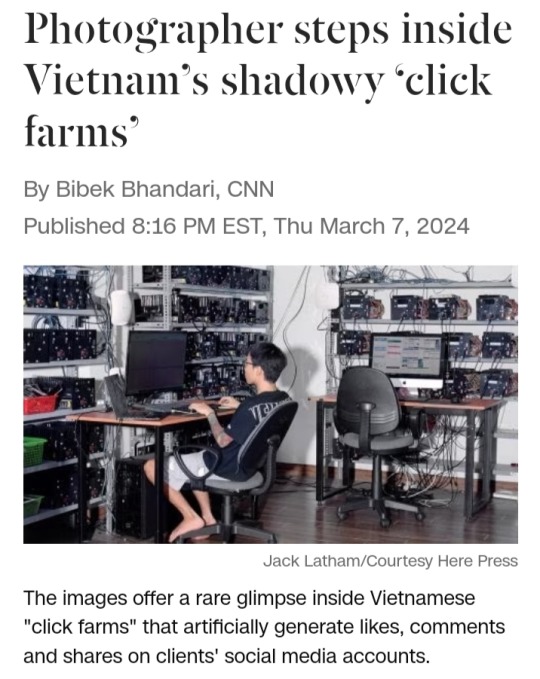
(CNN) — Jack Latham was on a mission to photograph farms in Vietnam — not the country’s sprawling plantations or rice terraces but its “click farms.”
Last year, the British photographer spent a month in the capital Hanoi documenting some of the shadowy enterprises that help clients artificially boost online traffic and social media engagement in the hope of manipulating algorithms and user perceptions.
The resulting images, which feature in his new book “Beggar’s Honey,” provide rare insight into the workshops that hire low-paid workers to cultivate likes, comments and shares for businesses and individuals globally.
“When most people are on social media, they want nothing but attention — they’re begging for it,” Latham said in a phone interview, explaining his book’s title.
“With social media, our attention is a product for advertisers and marketers.”
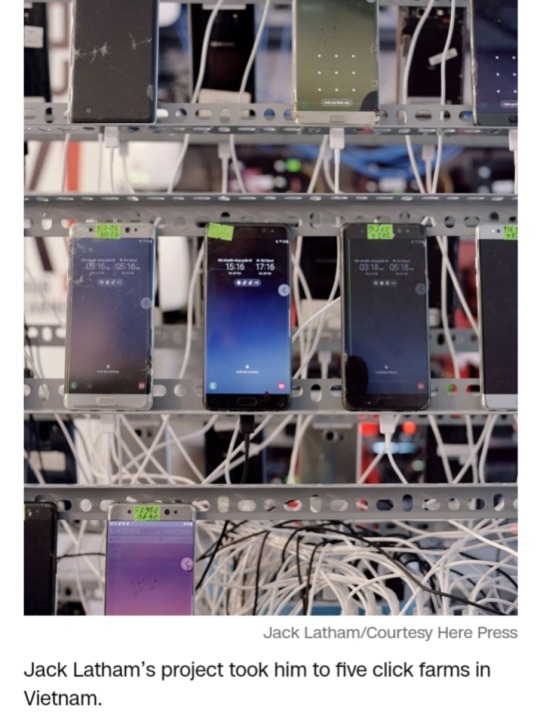
In the 2000s, the growing popularity of social media sites — including Facebook and Twitter, now called X — created a new market for well-curated digital profiles, with companies and brands vying to maximize visibility and influence.
Though it is unclear when click farms began proliferating, tech experts warned about “virtual gang masters” operating them from low-income countries as early as 2007.
In the following decades, click farms exploded in number — particularly in Asia, where they can be found across India, Bangladesh, Indonesia, the Philippines, and beyond.
Regulations have often failed to keep pace: While some countries, like China, have attempted to crack down on operations (the China Advertising Association banned the use of click farms for commercial gain in 2020), they continue to flourish around the continent, especially in places where low labor and electricity costs make it affordable to power hundreds of devices simultaneously.
‘Like Silicon Valley startups’
Latham’s project took him to five click farms in Vietnam.
(The click farmers he hoped to photograph in Hong Kong “got cold feet,” he said, and pandemic-related travel restrictions dashed his plans to document the practice in mainland China).
On the outskirts of Hanoi, Latham visited workshops operating from residential properties and hotels.
Some had a traditional setup with hundreds of manually operated phones, while others used a newer, compact method called “box farming” — a phrase used by the click farmers Latham visited — where several phones, without screens and batteries, are wired together and linked to a computer interface.
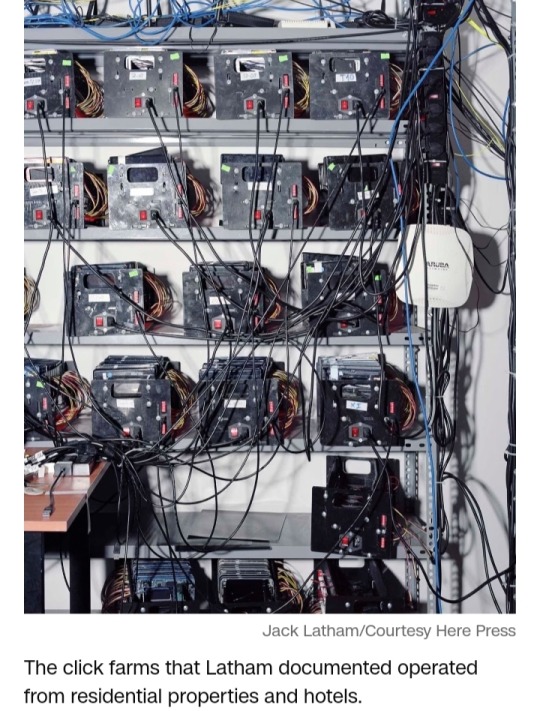
Latham said one of the click farms he visited was a family-run business, though the others appeared more like a tech companies.
Most workers were in their 20s and 30s, he added.
“They all looked like Silicon Valley startups,” he said. “There was a tremendous amount of hardware … whole walls of phones.”
Some of Latham’s photos depict — albeit anonymously — workers tasked with harvesting clicks.
In one image, a man is seen stationed amid a sea of gadgets in what appears to be a lonely and monotonous task.
“It only takes one person to control large amounts of phones,” Latham said. “One person can very quickly (do the work of) 10,000. It’s both solitary and crowded.”
At the farms Lathan visited, individuals were usually in charge of a particular social media platforms.
For instance, one “farmer” would be responsible for mass posting and commenting on Facebook accounts, or setting up YouTube platforms where they post and watch videos on loop.
The photographer added that TikTok is now the most popular platform at the click farms he visited.
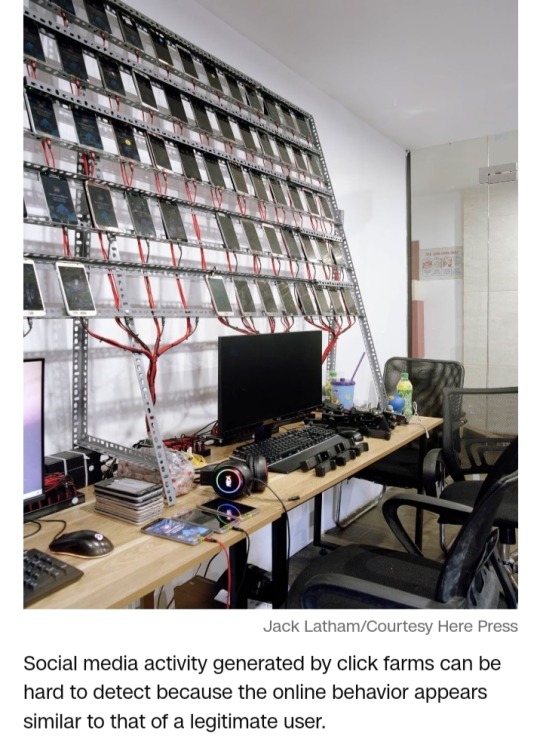
The click farmers Latham spoke to mostly advertised their services online for less than one cent per click, view or interaction.
And despite the fraudulent nature of their tasks, they seemed to treat it like just another job, the photographer said.
‘There was an understanding they were just providing a service,” he added. “There wasn’t a shadiness. What they’re offering is shortcuts.”
Deceptive perception
Across its 134 pages, “Beggar’s Honey” includes a collection of abstract photographs — some seductive, others contemplative — depicting videos that appeared on Latham’s TikTok feed.
He included them in the book to represent the kind of content he saw being boosted by click farms.
But many of his photos focus on the hardware used to manipulate social media —webs of wires, phones and computers.
“A lot of my work is about conspiracies,” Latham said. ” Trying to ‘document the machines used to spread disinformation’ is the tagline of the project. The bigger picture is often the thing we don’t see.”
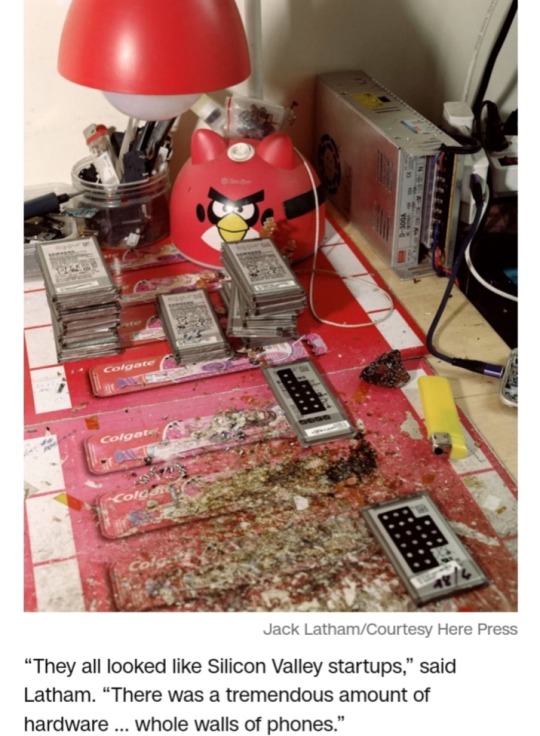
Click farms around the world are also used to amplify political messages and spread disinformation during elections.
In 2016, Cambodia’s then-prime minister Hun Sen was accused of buying Facebook friends and likes, which according to the BBC he denied, while shadowy operations in North Macedonia were found to have spread pro-Donald Trump posts and articles during that year’s US presidential election.
While researching, Latham said he found that algorithms — a topic of his previous book, “Latent Bloom” — often recommended videos that he said got increasingly “extreme” with each click.
“If you only digest a diet of that, it’s a matter of time you become diabetically conspiratorial,” he said.
“The spreading of disinformation is the worst thing. It happens in your pocket, not newspapers, and it’s terrifying that it’s tailored to your kind of neurosis.”
Hoping to raise awareness of the phenomenon and its dangers, Latham is planning to exhibit his own home version of a click farm — a small box with several phones attached to a computer interface — at the 2024 Images Vevey Festival in Switzerland.
He bought the gadget in Vietnam for the equivalent of about $1,000 and has occasionally experimented with it on his social media accounts.
On Instagram, Latham’s photos usually attract anywhere from a few dozen to couple hundred likes.
But when he deployed his personal click farm to announce his latest book, the post generated more than 6,600 likes.
The photographer wants people to realize that there’s more to what they see on social media — and that metrics aren’t a measurement of authenticity.
“When people are better equipped with knowledge of how things work, they can make more informed decisions,” he said.
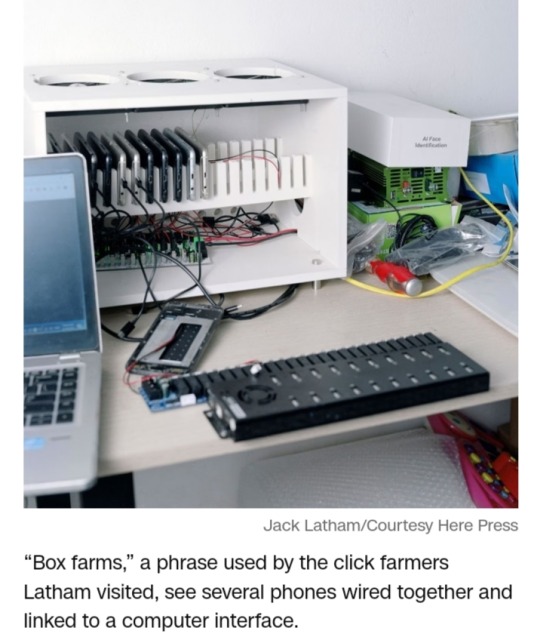
“Beggar’s Honey,” co-published by Here Press and Images Vevey, is available now.
#Jack Latham#click farms#box farms#Hanoi#Vietnam#Beggar’s Honey#box farming#social media#algorithms#user perception#trolls#PR#marketing#advertising#likes#comments#shares#digital profiles#virtual gang masters#bots#spam#China Advertising Association#click farmers#mass post#disinformation#misinformation#fake news#metrics
13 notes
·
View notes
Text
Knowing your reader
Writing your debut novel is a labor of love, but promoting it can be an entirely different beast. However, in the age of social media, particularly platforms like TikTok, connecting with your potential readers has never been easier. The key? Knowing your audience. here are some tipps.
Why knowing your reader is essential
1. Targeted Marketing: Understanding your reader's preferences, interests, and demographics allows you to create marketing content that resonates with them specifically. This targeted approach is more likely to yield results.
2. Engaging Content: When you know your reader, you can tailor your content to their tastes. This means sharing excerpts, behind-the-scenes insights, or personal stories that genuinely interest them.
3. Building a Community: By knowing your reader, you can create a community of like-minded individuals who share a passion for your genre or subject matter. This community can be invaluable in promoting your book.
How to get to know your reader
Research: Start by researching the readership of books similar to yours. What do they like about those books? What are their common interests and age groups? This research can provide valuable insights.
Social Media Analytics: Use the analytics tools on platforms like TikTok or other social media sites. This data can help you understand the demographics and interests of your followers.
Engage with Your Audience: Respond to comments, engage in discussions, and ask your followers about their preferences. This two-way interaction can reveal a lot about your readers.
Conduct Surveys: Consider creating surveys or polls to directly ask your audience about their reading habits and preferences. This can be a goldmine of information.
Track Performance: Monitor the performance of different types of content. What gets the most engagement? What resonates with your audience? Use this feedback to fine-tune your strategy.
Comment if you have some more tipps!!!

#writing#writers#writing tips#writing advice#writing inspiration#creative writing#writing community#books#film#filmmaking#screenwriting#novel writing#fanfiction#writeblr#writing rules#promoting#writers on tumblr#words#writers block#writblr#promotingbook#tiktok#fanfictionwriter#fanfiction writing#ao3 fanfic#ao3 writer#fanfic#ao3 author
35 notes
·
View notes
Text
Revolutionizing Labor Market Intelligence with Data Analytics
Talismatic is a cutting-edge labor market intelligence platform that is reshaping the way organizations navigate the job market. By leveraging advanced job market analytics, Talismatic empowers businesses to make data-driven decisions regarding talent acquisition, workforce planning, and competitive positioning.
Talismatic provides invaluable insights into job trends, skill demands, and competitor strategies, enabling companies to stay ahead in today's dynamic employment landscape.
0 notes
Text
Drawing on various theoretical perspectives such as treadmill of production, world systems theory, and ecological unequal exchange, green criminologists have posited that the adverse outcomes associated with ecological disorganization are tied to the expansionary tendencies of the capitalist world system. Here, ecological disorganization is the sum of the deleterious effects of two connected economic-ecological processes: ecological withdrawals that disrupt ecosystems by removing resources from the environment and ecological additions that disrupt ecosystems by adding pollution to environments. In an effort to promote growth and capital accumulation, in addition to exploiting labor, capitalist must expand the market, which means producing more goods and more demand for those goods. To increase production, capitalism must increase withdrawals of ecological resources, causing ecosystem damage or disorganization. Those raw materials are then fed into the manufacturing process where, applying fossil fuel and chemical energy, other forms of ecological disorganization are created: pollution or ecological additions. Drawing on these insights and from ecological Marxism, green criminologists suggested that the ordinary production of commodities via the capitalist process, creates ecological disorganization and can be conceptualized as a form of green crime from the perspective of nature and also as a form of green/ecological injustice.
Measuring the Ecological Impact of the Wealthy: Excessive Consumption, Ecological Disorganization, Green Crime, and Justice
26 notes
·
View notes
Text
Wage Inequality and Labour Market
By Sraddha R
In this blog post, we'll look at three compelling studies that shed light on wage disparities in Europe and India, as well as the critical role of labour market institutions. Take a seat, and let's get started!
INTRODUCTION
The labour market serves as a barometer for trends in employment, economic well-being, and the broader societal challenges posed by wage inequality. Our investigation begins with an acknowledgement of the modern global economy's profound impact on globalisation, technological advancements, and evolving work structures. These seismic shifts reshape industries, redefine skill requirements, and, as a result, affect wage structures. Wage inequality, which reflects the unequal distribution of earnings across gender, ethnicity, education, and occupation, is at the heart of this complex issue.
Study 1: The Structure of the Labour Market and Wage Inequality in European Countries
This study focuses on France, Germany, and Italy, meticulously analysing changes in wage inequality from 2005 to 2013. The findings show distinct patterns, such as a decrease in wage inequality in Germany, a decrease in France with explicit job polarisation structures, and a significant increase in Italy. Using a decomposition approach, the study considers variables such as gender, marital status, health, experience, education, contract type, economic status, and job categories.
The study emphasises the role of national labor-market protections, historical policy spending, and broader socioeconomic and political factors in shaping wage inequality trends. Tailored policy recommendations are emerging, urging France and Germany to implement policies that promote women's participation and improve job-related careers. In contrast, Italy faces challenges such as a lack of a legal minimum wage and political instability, necessitating specific policy responses.
Study 2: Recent Trends in India's Wealth Inequality
Using data from the Annual Income and Expenditure Surveys, this paper investigates wealth inequality in India using decomposition analyses. The study differentiates contributions from within and between group components, identifying sources of wealth concentration and drawing parallels between wealth and consumption inequality trends.
According to the study, increasing wealth concentration in India is linked to neoliberal growth, emphasising the failure to address employment and earnings disparities. While the study provides valuable insights, it is suggested that a more explicit discussion of policy implications and interventions be included. A complex policy framework is required to guide future research and inform effective policy decisions.
Wage Inequality and Low Pay: The Role of Labour Market Institutions, Study 3
The impact of labour market institutions on low-wage employment in OECD countries is investigated in this study. It seeks to comprehend the impact of trade unions, collective bargaining, and wage regulations on wage distribution, particularly in low-wage industries. The study distinguishes between different wage distribution segments, recognising variations in the analysis through the use of bivariate correlations and incorporating various control variables such as minimum wages and unemployment benefits.
According to the study's findings, labour market institutions account for more than 60% of cross-country differences in low pay. According to the study, strong unions protect against low pay, whereas centralised bargaining systems effectively limit wage disparities at the top. Minimum wages and welfare systems have varying effects across wage distribution segments. Governments, according to the study, can address rising earnings disparities and low-wage employment by supporting effective labor market institutions.
Comparative Evaluation
Our comparative analysis reveals the distinct perspectives provided by each study, shedding light on various dimensions and dynamics in different countries. The in-depth examination of economic inequality ranges from changes in wage inequality in European countries to wealth dynamics in India and the impact of labour market institutions on low-wage employment in OECD countries.
Conclusion
Taken together, the studies emphasise the interconnectedness of factors influencing income distribution and the importance of nuanced, context-specific policy decisions. The journey has shed light on labour market dynamics and economic outcomes, emphasising the complexities of addressing wage inequality in our pursuit of an equitable future where the benefits of economic growth are shared by all.
16 notes
·
View notes
Text
Sales Automation: Streamlining Processes for Efficient Lead Generation
Article by Jonathan Bomser | CEO | AccountSend.com
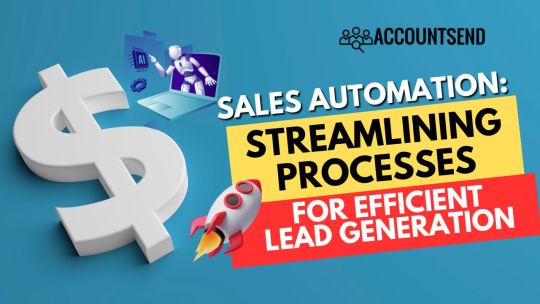
In today's lightning-paced business ecosystem, the beacon of Sales Automation shines brighter than ever as a transformative force propelling lead generation into a realm of unprecedented efficiency and success. This voyage takes us through seven pivotal strategies that harness the true potential of Sales Automation, ensuring that you harness its power to revolutionize your lead generation journey.
DOWNLOAD THE SALES AUTOMATION INFOGRAPHIC HERE
Implement a Customer Relationship Management (CRM) System
Imagine a command center at your fingertips that orchestrates your lead interactions with finesse. This is where the Customer Relationship Management (CRM) System, the linchpin of Sales Automation, comes into play. This technological marvel enables you to seamlessly centralize customer data, track interactions, and automate tasks with precision. Picture the possibilities as your sales team focuses on nurturing connections that drive conversions.
Utilize Marketing Automation Tools
Bid farewell to labor-intensive marketing efforts as Sales Automation brings forth the magic of marketing automation tools. These remarkable instruments streamline repetitive marketing tasks, from orchestrating email campaigns to nurturing leads and scheduling social media content. By crafting strategic workflows and triggers, you hold the power to deliver tailor-made messages that resonate with your prospects. The outcome? Engagement and conversion rates that soar to new heights.
Qualify Leads with Lead Scoring
In the labyrinth of potential leads, imagine having a compass that guides you to the most promising ones. Enter lead scoring, a beacon of clarity amidst the complexity. Through meticulous criteria encompassing demographic data, engagement metrics, and behavioral patterns, lead scoring empowers your sales team to prioritize leads ripe for conversion. This orchestration of efficiency elevates your conversion rates while maximizing your team's efforts.
Streamline Sales Processes with Workflow Automation
Embrace the liberation from manual, time-consuming sales processes through the elegance of workflow automation. Bid adieu to the mundane tasks of follow-ups, appointment scheduling, and proposal generation. Workflow automation transforms these into seamless symphonies, gifting your sales team precious time. This temporal freedom translates into a focus on nurturing relationships, cultivating an environment primed for deal closure.
youtube
Integrate Sales and Marketing Efforts
The synergy of sales and marketing isn't a mere concept; it's a dynamic strategy made tangible by Sales Automation. Witness the convergence of these vital forces as silos dissolve, and a harmonious collaboration emerges. Valuable insights flow seamlessly, lead progress is tracked cohesively, and communication flourishes throughout the sales cycle. The result? A seamless alliance that fuels conversions and magnifies results.
Implement Chatbots and AI-powered Assistants
In an era where responsiveness defines success, envision AI-powered chatbots as your digital allies. These innovative assistants redefine customer support and engagement by handling routine inquiries, offering instant responses, and even assisting in lead qualification. The outcome? Your team is unburdened, channeling their expertise into intricate tasks that propel your business forward.
Continuously Analyze and Optimize
Success isn't a static destination; it's an evolving journey. Data analysis becomes your compass in the realm of Sales Automation. Regularly delve into the wealth of insights harvested by your automation tools. Decode lead behavior, unravel conversion rates, and unveil sales performance intricacies. Armed with these insights, fine-tune your lead generation strategies, refine processes, and unearth optimization opportunities.
In essence, Sales Automation stands as the cornerstone of lead generation efficiency. Through adopting a CRM system, harnessing marketing automation tools, embracing lead scoring, automating sales workflows, aligning sales and marketing endeavors, integrating AI-powered support, and ceaselessly optimizing strategies, you can reshape your lead generation narrative. Embrace Sales Automation as the lifeblood of your sales strategy, and witness your lead generation expedition thrive with newfound efficiency and efficacy. The time has come to seize Sales Automation and redefine your lead generation journey.
#Sales Automation#Lead Generation#CRM#Business Owners Database#Verified B2B Emails#B2B Contact Database#CEO Email Addresses#Sales Leads Database#B2B Email List#B2B Leads Database#Verified Business Leads#B2B Leads List#businessgrowth#leadgeneration#b2b#accountsend#youtube#entrepreneurship#b2bleadgeneration#b2bsales#businesstips#sales#Youtube
34 notes
·
View notes
Text
West on the Usefulness of Marxist Thought
I think that the Marxist intellectual tradition remains indispensable in order to keep track of certain forms of social misery, especially these days in terms of the oligopolies and monopolies that take the form of transnational corporations with a disproportionate amount of wealth and power, not just in America but around the world. You need some Marxist theoretical insights in order to keep track of that.
At the same time, I am against general theories of oppression, and therefore, for me, my particular stand within the Marxist tradition is linked primarily to that of Gramsci, which always places stress on historic specificity, on concrete circumstances and situations. This does not require a general theory of oppression per se. And in that regard I think one can talk about a Gramscian strand in the Marxist tradition that is suspicious of general theory, [...] but it's still not a question of eliminating the remnants of Marxism per se. Not at all.
I don't see how, in fact, we can understand the market forces around the world and the fundamental role of transnational corporations, the subordination of working people, the tremendous class conflicts going on around the world at the marketplace between management and labor without understanding some of the insights of the Marxist tradition.
- Cornel West (“On My Intellectual Vocation” from his Reader, page 24). Formatting changed to avoid wall of text.
7 notes
·
View notes